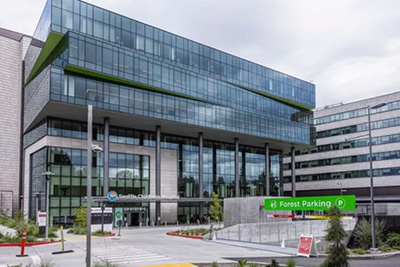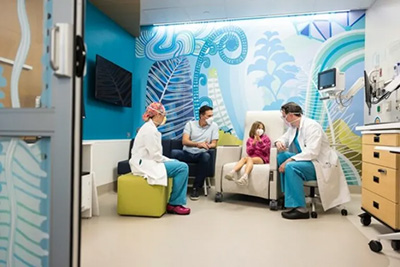Seattle Children’s Expands Pediatric Cancer and Blood Disorders Outpatient Services in a New State-of-the-Art Clinic Space
August 3, 2022
Beginning in fall 2022, pediatric, adolescent and young adult patients with cancer and blood disorders in the greater Pacific Northwest will be cared for at a new state-of-the-art facility specifically designed for transformative, patient-centered care.
 Seattle Children’s latest addition, called Forest B, is the new home for the Cancer and Blood Disorders Center’s outpatient services.
Seattle Children’s latest addition, called Forest B, is the new home for the Cancer and Blood Disorders Center’s outpatient services.
Known as Forest B, the 310,000-square-foot addition to Seattle Children’s hospital campus will be the new home for Seattle Children’s Cancer and Blood Disorders Center (CBDC), one of the top-ranked programs of its kind in the United States. The CBDC provides exceptional and compassionate care, novel therapies and lifesaving treatments to achieve the best outcomes, grounded by our focus on family-centered care and health equity.
The dedicated space in Forest B nearly doubles CBDC’s clinical capacity and expands our ability to treat more patients to meet the growing need for services in the region.
Forest B will also house the Pediatric Blood and Marrow Transplant (BMT) outpatient clinic, which is moving from its current home at Fred Hutchinson Cancer Center to Seattle Children’s. This move will bring all pediatric cancer and blood disorders programs under one roof at Seattle Children’s — making it easier for patients and their families to receive the same exceptional and compassionate care from the dedicated teams at Seattle Children’s and Fred Hutchinson Cancer Center.
Services that come to the patient, rather than the other way around
The new CBDC/BMT spaces in Forest B feature patient-centric designs with a “universal room” concept wherein all services are coordinated and come to the patient. Rather than traveling to multiple appointments throughout the clinic, patients and families will remain in one place, where all of their multidisciplinary team and consult visits, blood draws, infusion and follow-up tests are conducted.
 Providers meet with a patient in one of Forest B’s universal rooms.
Providers meet with a patient in one of Forest B’s universal rooms.
Universal rooms will be patients’ and families’ “home” for the day, eliminating the need to wait in lines or lobbies or bring their items to different areas. In direct response to requests from patients and families during Forest B’s design phase, each universal room includes:
- A “transformer” chair that fully reclines into a bed. This design allows patients to lie flat or nap, particularly useful for small children staying in the room for many hours.
- Concurrent care. Each room is designed for multiple care functions to happen concurrently. For example, a care team member can consult with a family while another care team member hooks up a blood transfusion or chemotherapy treatment.
- Features that minimize intrusions. Families asked us to design rooms that minimize intrusions. Universal rooms include many features, like pass-through cupboards that open from the outside, allowing medications, medical supplies and waste to move in and out of the room without someone actually entering the room.
- Entertainment. Each room is outfitted with an iPad and GetWellNetwork TV access so patients and families can watch on-demand content.
Gathering spaces located near the universal rooms allow patients and families (including siblings) to get a break from the universal room. A dedicated play specialist will staff the gathering spaces.
Dr. Mignon Loh is the new division chief of Pediatric Hematology, Oncology, Bone Marrow Transplant and Cellular Therapy at Seattle Children’s. She said, “Forest B is going to be amazing — patients will receive all the care they need in the same room, instead of shuttling to different appointments in different places. It’s a new paradigm, and it shows how Seattle Children’s is at the forefront of improving the patient experience.”
For care teams, Forest B’s innovative design optimizes the work environment so they can focus on patient care.
- A dedicated conference room allows care team members to talk privately with families, away from an exam room, about the need for a transplant or chemotherapy.
- A specially designed consult room is outfitted with telehealth equipment for in-the-moment consultations with outside providers or to call into grand rounds or tumor board meetings.
- There are special places for providers to collaborate, hold spontaneous multidisciplinary clinics, review notes or simply recharge.
Shortening the bridge between research and clinical care
Forest B will enhance CBDC&rsquo s ability to provide seamless, coordinated care specific to each child's unique needs and to relentlessly pursue better treatments for the toughest pediatric cancer and blood disorders like sickle cell disease, leukemia, bleeding disorders and thalassemia.
Forest B&rsquo's modern clinical facility presents an opportunity to shorten the bridge between research and clinical settings. This aligns with Dr. Loh&rsquo's vision to accelerate cancer and blood disorders research underway within Seattle Children&rsquo's Research Division so that new research opportunities become available to the patients we serve, and cancer and blood disorders models of care can be transformed to improve lives.
To learn more about the Cancer and Blood Disorders Center, please contact us at 206-987-2106 or on our Refer a Patient page. For more information about our research at the Ben Towne Center for Childhood Cancer Research, email us at [email protected].